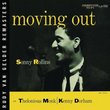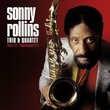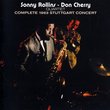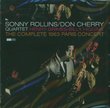| All Artists: Sonny Rollins Title: Our Man in Jazz Members Wishing: 1 Total Copies: 0 Label: RCA Victor Europe Release Date: 12/7/2004 Album Type: Import, Original recording remastered Genres: Jazz, Pop Styles: Modern Postbebop, Bebop Number of Discs: 1 SwapaCD Credits: 1 UPC: 766487210720 |
Search - Sonny Rollins :: Our Man in Jazz
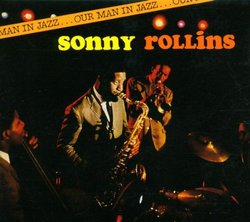 | Sonny Rollins Our Man in Jazz Genres: Jazz, Pop
Remastered reissue of 1962 album. Packaged in a digipak reproduction of the original artwork. 6 tracks including three bonus 'You Are My Lucky Star', 'I Could Write A Book' & 'There Will Never Be Another You'. |
Larger Image |
CD DetailsSynopsis
Album Description Remastered reissue of 1962 album. Packaged in a digipak reproduction of the original artwork. 6 tracks including three bonus 'You Are My Lucky Star', 'I Could Write A Book' & 'There Will Never Be Another You'. Similar CDs
|
CD ReviewsThe Possibilities directions | Space Time Foam | 02/02/2006 (5 out of 5 stars) "If Sonny Rollins had continued in this direction, he might not have been eclipsed by John Coltrane as the most influential tenor saxophonist. This album is one of David S. Ware's personal favorite jazz albums. East Broadway Rundown is also free and an excellent cd but what makes this one different is that it is live. Sonny Rollins has been deemed by critics to be at his best live (after seeing him live, I would support this). Also, with the members of Ornette Coleman's groundbreaking quartet (except of course Ornette) backing him up, the album has the same manic energy and unpredictability of early free jazz. It still is grounded in hard bop, because Sonny Rollins while wanting to absorb the "new thing in jazz" was still somewhat of a traditionalist. However, this is his most creative and innovative playing and is a standout among the myriad of albums he has recorded." A little out of place, Rollins explores free jazz. Michael Stack | North Chelmsford, MA USA | 08/30/2005 (3 out of 5 stars) "1962 was a stunning year for Sonny Rollins-- after reemerging from a sabbatical from music and leading a quartet featuring guitarist Jim Hall (resulting in the albums "The Bridge" and several months later, "What's New"), he spent the summer playing in a pianoless quartet featuring trumpeter Don Cherry and drummer Billy Higgins (along with Rollins' bassist Bob Cranshaw). Part of the reason for Rollins taking a break from music is that he felt in the face of performers like Ornette Coleman and John Coltrane, he needed something more. This recording, symbolic of Rollins' attempt to find that more, is a good example of this. Admittedly, Rollins isn't quite comfortable in this environment-- certainly not the extent he would be leading a similar quartet four years later ("East Broadway Run Down"). It could also be the song selection that contributes to this tentativeness-- two of Rollins' older pieces get updates ("Oleo" and "Doxy") and standard "Dearly Beloved" gets a reading. "Oleo" is exciting, fast, and fluid, and extremely loose, perhaps a bit too much. Still, while the horns feel a bit out of place, Cranshaw and Higgins both take completely brilliant solos, particularly Higgins, who references the theme and plays with space and time in a delicate fashion. "Doxy" fares much better, a bit shorter in length, jaunty and playful, Cherry and Rollins both solo effectively and with a great excitement and fluidity to their performance and again Cranshaw, who seems to be really benefiting from the environment, solos superbly. But as exciting (if a bit uneven) as these pieces are, "Dearly Beloved" is kind of a mess-- it starts off ok, with the rhythm section swinging and Rollins a bit more lyrical, but when the rhythm section opens up, the piece pretty much melts apart. This release is augmented by three bonus tracks-- all standards, read in the studio early in 1963 and given brief performances by the same quartet, but with Henry Grimes sitting in instead of Cranshaw. Rollins and company tackle the stnadards with quite a bit of fire-- in particular "I Could Write a Book" gets a great reading, but all of them seem to end before they get anywhere. Still, these were pretty hard to find (only previously being issued on a split album), and they are decent performances and nice to have. Rollins never quite sounded comfortable tackling free jazz, nonetheless, this recording is a good one, and worth the investment for fans of any of the gentlemen in the ensemble." Exciting! Strange! Live! Nikica Gilic | Zagreb, Croatia | 03/17/2008 (5 out of 5 stars) "Sonny Rollins was not the man to check out if you're interested into the fre-jazz movement (and I'm hardly an expert on the matter), but this is quite an interesting album!
Although Billy Higgins and Don Cherry are the free-jazz musicians to watch at the time, fresh from collaboration with Ornette Coleman, Rollins, in his "post-bridge" (and, I guess, post-"The Bridge") phase was a remarkably strong player, capable of bringing to the free-jazz movement some traditional style virtuosity and power... I repeat, I am one of those guys who don't even pretend to actually understand free jazz, but I like this album, and Sonny's contributions (perhaps because I'm a conservative at the core) are the things that really shine here...." |

 Track Listings (6) - Disc #1
Track Listings (6) - Disc #1